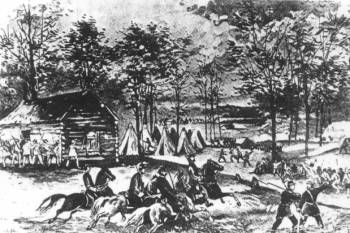The Battle of Shiloh occurs near a small log church in western Tennessee. The primary fighting will last until the morrow.
The church building, destroyed shortly after the battle, is Shiloh United Methodist Church. Some references indicate that a Baptist congregation also utilizes the building. Indeed, Protestant denominations frequently share buildings in the rural South.
General Ulysses S. Grant is leading a Union army deep into Tennessee; General William Tecumseh Sherman accompanies him. While recent Union advances in Tennessee have been largely unchecked by overwhelmed Confederate forces, today is a different story. Confederate forces under Generals Albert Sidney Johnston and P. G. T. Beauregard launch a surprise attack on Grant near the Baptist church. In today’s fighting, the Confederates successfully push Union forces backward. Yet the Confederate offense is unable to sustain its momentum, while Union reinforcements on the 7th provide enough fire power to turn the tables on their foes.
By the time the two sides totally disengage on the 8th, the Battle of Shiloh has become the bloodiest battle yet of the Civil War, with 13,047 Union casualties and 10,699 Confederate casualties. The Union wins this crucial battle, but at a steep price that results in short-term criticism of Grant because of the high casualties. Many Baptists lose their lives on both sides of the conflict.
Among the eyewitnesses is 21-year old Confederate soldier Henry Morton Stanley. Ten years hence, Stanley will become famous as the explorer who finds Dr. David Livingstone in the interior of Africa.
But for the moment, Stanley recounts the Battle of Shiloh as he witnessed it:
Day broke with every promise of a fine day. Next to me, on my right, was a boy of seventeen, Henry Parker. I remember it because, while we stood-at-ease, he drew my attention to some violets at his feet, and said, ‘It would be a good idea put a few into my cap. Perhaps the Yanks won’t shoot me if they see me wearing such flowers, for they are a sign of peace.’ ‘Capital,’ said I, ‘I will do the same.’ We plucked a bunch, and arranged the violets in our caps. The men in the ranks laughed at our proceedings, and had not the enemy been so near, their merry mood might have been communicated to the army.
We loaded our muskets, and arranged our cartridge pouches ready for use. Our weapons were the obsolete flintlocks and the ammunition was rolled in cartridge-paper, which contained powder, a round ball, and three buckshot. When we loaded we had to tear the paper with our teeth, empty a little powder into the pan, lock it, empty the rest of the powder into the barrel, press paper and ball into the muzzle, and ram home. Then the Orderly-sergeant called the roll, and we knew that the Dixie Greys were present to a man. Soon after, there was a commotion, and we dressed up smartly. A young Aide galloped along our front, gave some instructions to the Brigadier Hindman, who confided the same to his Colonels, and presently we swayed forward in line, with shouldered arms. Newton Story, big, broad, and straight, bore our company-banner of gay silk, at which the ladies of our neighbourhood had laboured.
As we tramped solemnly and silently through the thin forest, and over its grass, still in its withered and wintry hue, I noticed that the sun was not far from appearing, that our regiment was keeping its formation admirably, that the woods would have been a grand place for a picnic; and I thought it strange that a Sunday should have been chosen to disturb the holy calm of those woods.
Before we had gone five hundred paces, our serenity was disturbed by some desultory firing in front. It was then a quarter-past five. ‘They are at it already,’ we whispered to each other. ‘Stand by, gentlemen,’ – for we were all gentlemen volunteers at this time, – said our Captain, L. G. Smith. Our steps became unconsciously brisker, and alertness was noticeable in everybody. The firing continued at intervals deliberate and scattered, as at target-practice. We drew nearer to the firing, and soon a sharper rattling of musketry was heard. ‘That is the enemy waking up,’ we said. Within a few minutes, there was another explosive burst of musketry, the air was pierced by many missiles, which hummed and pinged sharply by our ears, pattered through the tree-tops and brought twigs and leaves down on us. ‘Those are bullets,’ Henry whispered with awe.
Then the Confederates are upon the enemy, charging and yelling:
Those savage yells, and the sight of thousands of racing figures coming towards them, discomfited the blue-coats; and when we arrived upon the place where they had stood, they had vanished. Then we caught sight of their beautiful array of tents, before which they had made their stand, after being roused from their Sunday-morning sleep, and huddled into line, at hearing their pickets challenge our skirmishers. The half-dressed dead and wounded showed what a surprise our attack had been…. [later, again encountering the enemy] the yelling and shouting were taken up by thousands. ‘Forward, forward; don’t give them breathing time!’ was cried. We instinctively obeyed, and soon came in clear view of the blue-coats, who were scornfully unconcerned at first; but, seeing the leaping tide of men coming on at a tremendous pace, their front dissolved, and they fled in double-quick retreat. Again we felt the ‘glorious joy of heroes.’ It carried us on exultantly, rejoicing in the spirit which recognises nothing but the prey. We were no longer an army of soldiers, but so many school-boys racing; in which length of legs, wind, and condition tell. “…
Yet by tomorrow evening, the Confederates have been defeated and Stanley is a captive of the United States army. Fortunately, he survives his captivity and the war.
Sources: The Battle of Shiloh (link); “The Battle of Shiloh, 1862” EyeWitness to History (link); illustration (link)



